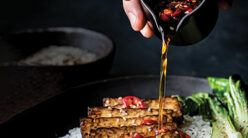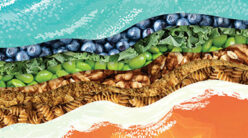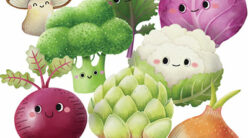
Cheerios (Original)
Serving Size: 1 cup (30g)
Calories: 110
Fat: 2g
Fiber: 3g
Sugar: 1g
Sodium: 210mg
Carbs: 22g
Protein: 3g
Cheerios was made and marketed in 1941 by General Mills under the name “Cheeri Oats,” and the named changed to “Cheerios” because of the “o” shape. Cheerios has always been and remains a “children’s favorite cereal.” Be careful with the flavored cheerios, though, because even the multigrain Cheerios are loaded with sugar!

Mesa Sunrise Flakes
Serving Size: ¾ cup (30g)
Calories: 120
Fat: 1.5g
Fiber: 3g
Sugar: 4g
Sodium: 130mg
Carbs: 24g
Protein: 3g
An organic breakfast cereal made with flax, corn, and amaranth grain. An excellent choice of cereal for those intolerant to wheat or have gluten allergies such as celiac disease! The majority of Nature’s Path brand cereals are sweetened using natural fruit juices.

Grape Nuts Cereal
Serving Size: ½ cup (58g)
Calories: 208
Fat: 1g
Fiber: 5g
Sugar: 7g
Sodium: 354mg
Carbs: 47g
Protein: 6g
Neither grapes nor nuts are in this cereal. The original cereal was made using grape sugar and along with its texture, the name was developed. A nice nutty cereal developed by C.W. Post in 1897. Post was originally a patient of Dr. Kellogg and later became a cereal competitor to him.

Shredded Wheat
Serving Size: per 2 oblong biscuits (46g)
Calories: 156
Fat: 0g
Fiber: 5g
Sugar: 0g
Sodium: 2mg
Carbs: 38g
Protein: 5g
This is a breakfast cereal made from 100% whole wheat. Don’t be fooled and buy the versions with attractive sugary coatings: stick with the plain original! Henry Perky was the inventor of shredded wheat back in 1893. Shredded wheat is now made and packaged under a few brands names including Post, Kraft, Nabisco, and Kellogg’s.

Weetabix
Serving Size: 2 biscuits (35g)
Calories: 117
Fat: 0g
Fiber: 4g
Sugar: 0g
Sodium: 0mg
Carbs: 23g
Protein: 3.5g
Weetabix was made in 1926 by Edward Halsey in Melbourne, Australia, through the Sanitarium Health Food Company associated with the Seventh-day Adventist Church. Three men from South Africa and England took the Weetabix product and began producing and selling it in the U.K., later in the U.S., and finally in Canada. In the year 2000, Weetabix became a top-selling cereal brand in the United Kingdom.






